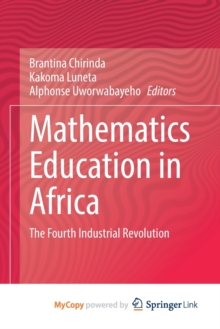Chapter 1: Is Africa ready for the 4IR? Fidele Ukobizaba, Ezekiel Nsabayezu and Alphonse Uworwabayeho
Chapter 2: Can the Fourth Industrial Revolution (4IR) resolve why the teaching of mathematics in the current paradigm continues to be decontextualised and ineffective; Kakoma Luneta.
Chapter 3: Alignment and Gaps of the Competency-Based Mathematics Curriculum and the Fourth Industrial Revolution; Penina Kamina and Mary A. Ochieng
Chapter 4: Mathematics educators' readiness for online education in the Fourth Industrial Revolution - A case of two selected Universities in Ethiopia; Tola Bekene Bedada; France Machaba; and Mekdes Minjar Manea
Chapter 5: Mathematics Education and the Fourth Industrial Revolution (4IR): Are the High School Mathematics Teachers Ready in Nigeria?; Musa Adekunle Ayanwale, Mdutshekelwa Ndlovu & Jumoke Iyabode Oladele
Chapter 6: Revamping the Zimbabwean mathematics curriculum to align it with the demands of fourth industrial revolution; Gladys Suzuma, Conilius Changwiza, and Brantina Chirinda
Chapter 7: Redefining Distance Learning for the African Context: Lessons Learnt from Egyptian Educators; Mariam Makramalla
Chapter 8: Implementing Assessment as Learning with Computer Adaptive Learning for Enhancing STEM Education in Africa: A Fourth Industrial Revolution Possibility; Jumoke I. Oladele, Mdutshekelwa Ndlovu and Musa A. Ayanwale
Chapter 9: Teaching and Learning Mathematics Using Technology in Basic Education Schools in Rwanda; Emmanuel Iyamuremye, Joseph Njiku, Jean Francois Maniraho, Irenee Ndayambaje, and Charles Magoba Muwonge
Chapter 10: Exploring the challenges concerning the teaching and learning mathematics during the fourth industrial revolution in the selected Rwandan secondary schools; Aloys Iyamuremye, Jean de Dieu Kwitonda, Ezechiel Nsabayezu and Jean Claude Habimana
Chapter 11: An experimental approach for learning mathematical functions in secondary school using GeoGebra software in Niger republic; Abdoul Massalabi NOUHOU and Abdou Moumouni
Chapter 12: Instances of instrumental orchestration when a teacher integrates GeoGebra in solving linear inequalities in the context of linear and quadratic functions; Charles Smith
Chapter 13: Fault lines in designing learning activities for practising mathematics teachers: An autoethnographic account; Cyril Julie
Chapter 14: Factors Influencing Preservice Teachers' Adoption of Interactive Social Media Platforms in Mathematics Teacher Education in Malawi; Fraser Gobede, Mercy Kazima and Justina Longwe
Chapter 15: The Use of Animal Metaphors to Reveal Self-perceptions of Grade Three Namibian Learners Who Experienced Mathematics Learning Difficulties During the COVID-19 Pandemic
Cloneria Nyambali Jatilen and Shemunyenge Taleiko Hamukwaya
Chapter 16: Using 4IR to enhance learners' self-regulated skills to solve circle geometry problems; Puleng Motseki
Chapter 17: Emerging realities from COVID-19 and the 4IR: mathematics education lecturers' autoethnographic experiences; Hlamulo Mbhiza, Zingiswa Jojo, Masilo Motshidisi and
France Machaba
Chapter 18: WhatsApp as a social media to enhance dialogic interactions in mathematics: Grade 9 teachers and learners' voices; Tshegofatso Makgakga

